India Policy Foundation Webinar on “Global Minority Report”
Total Views |
India Policy Foundation Webinar on
“Global Minority Report”
January 21, 2023
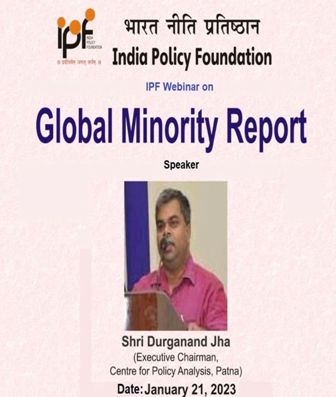
Speaker:
Shri Durga Nand Jha
(Executive Chairman, Centre for Policy Analysis, Patna)
Moderator:
Dr Kuldeep Ratnoo
(Director, India Policy Foundation)
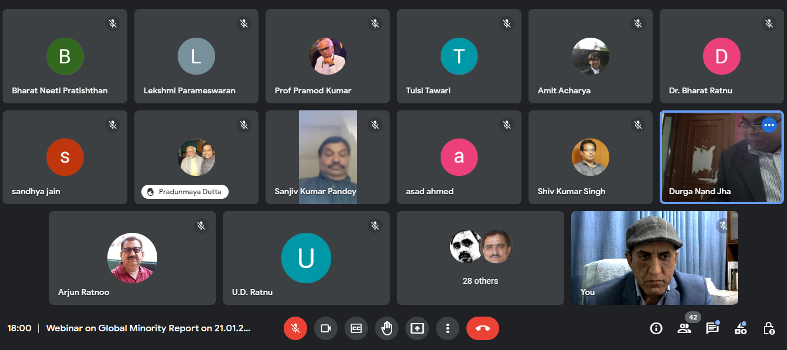
Dr Kuldeep Ratnoo:
Namaskar! I welcome you all to today’s webinar organised by India Policy Foundation. The topic of today’s discussion is Global Minority Report. We often read and hear from news reports that the condition of minorities is not good in India and that they are oppressed. This was regular feature during the time when the Citizenship Amendment Act (CAA) was passed by Parliament. Such reports and rankings are often published by countries in the West in which it is claimed that the status of minorities is not good in India. The frequency of such reports has increased ever since Narendra Modi became the prime minister.
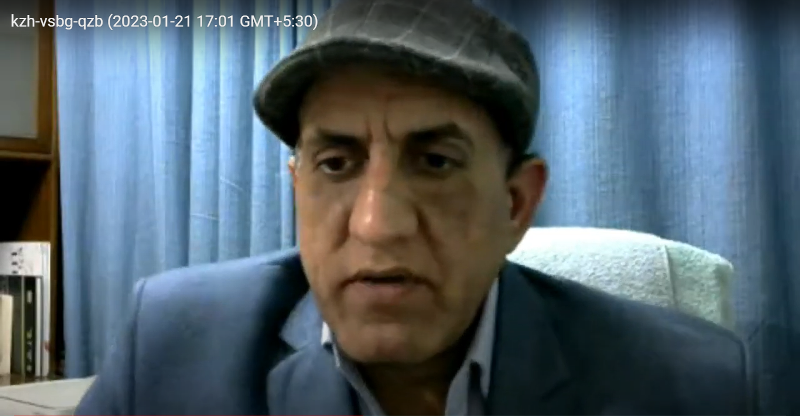
Shri Durga Nand Jha is the Executive Chairman of the Patna-based Centre for Policy Analysis. Earlier, he had worked on the India Minority Report which was released in 2018. After that, he started work on the Global Minority Report. This was released in last November by the former Vice President of India, Shri M. Venkaiah Naidu in New Delhi. This report was widely discussed in the media. We wanted to discuss this report in an in-depth manner throwing light on what was the need for such a report, what are the methodologies used in ranking the countries and the findings of the report and the recommendations given. We wanted Shri Durga Nand to come and talk about the motivation behind this report and how he intends to take this forward.
Durga Nand Jha was born in Bihar. He was active in the policymaking circles of Delhi before he moved to Patna. He was the editor of Swadeshi Patrika (English). He was associated with Planning Commission for a long time as a researcher. He has made significant contributions to the economic policy making of the country. After that, he shifted his focus to study issues concerning minorities and has done commendable work in this area. Right now, he is the Executive Chairman of Centre for Policy Analysis, Patna. I welcome him to today’s webinar.
I request him to throw light on why he felt there was a need for a Global Minority Report, how is this report different from the reports that are being published on minorities, his research methodologies and the case studies that are included in the report.
Durga Nand Jha:
Thank you, Kuldeep ji. I would like to first express my gratitude to India Policy Foundation for giving me this opportunity to present my views on the Global Minority Report.
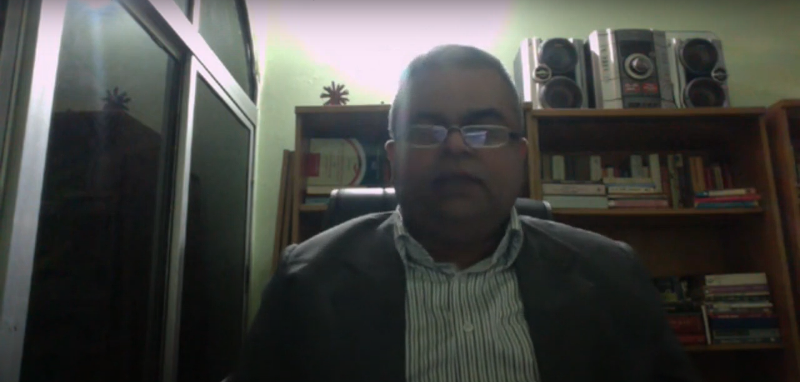
One of the biggest reasons for coming out with the Global Minority Report is that till now there has not been an effort to publish a report that systematically looks at the status of minorities globally in a neutral manner. The USA has been coming out with a religious freedom report but that is focussed on a few countries in Asia and Africa and often have many biases. There is a strategic agenda behind it and it is not concerned about religious minorities. You will never find a report on North American, European or Christian countries. Usually whenever the West hits a roadblock in their conversion agendas, they come out with such reports targeting Asian and African nations. Because of these factors, a comprehensive study was attempted on this issue. The study has also attempted to compare the status of minorities in different nations.
Earlier we had selected 125 countries for the study but we were unable to gather data on some of these countries, so finally decided to focus on 110 countries and used 32 variables for the study. I find it important to throw light on the background of this study before going into other details.
One of the main objectives of this report is to sensitise the international community on the status of minorities. For example, if Hindus face problems in Bangladesh or Pakistan, the issue never finds a place in the international media. On the other hand, if a Christian faces the same situation in Pakistan, it immediately becomes international news. The environment created has also given rise to a biased narrative. So, it was important to initiate discussion on those minorities who never form part of the existing narratives.
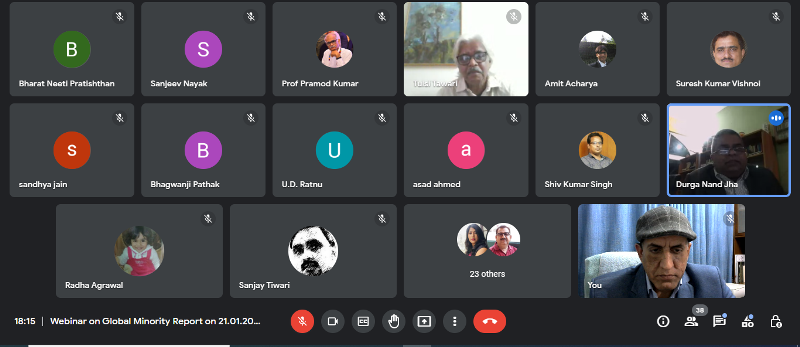
Secondly, when we were studying the approach of different nations to minorities, I observed three things – in some countries religious minorities are persecuted, in others they are discriminated and in some others they face the problem of non-recognition. The third issue is a major concern as in some countries those people belonging to a different sect are not recognised as citizens. For example, Baha’is are discriminated against in Iran, Ahamadiyas face non-recognition in Pakistan etc. In Christian countries, Jehovah's Witnesses are also subjected to non-recognition. They are often dismissed as a cult.
I decided to find the root cause of these problems which I realised is there because of religious theology. Religion is important for a society as it builds ethical order. In the absence of religion, it may be possible that there will be ethical anarchy in a society. So, we cannot underestimate the importance of religion. However, religion also plays a negative role. In a way, it is giving rise to regimentation in the society. When we analysed this, we could see that there are many religions that believe in the idea of one God. In this, there are some that also believe that the concept of God is also the same and there is no room for any deviations. Such a thought leads to fanaticism and it cannot be stopped. There is a thought that only they are right and the only way to bring others on the same path is through conversion. In my report, I have argued that conversion is the biggest form of religious intolerance. Due to this, you are unable to accept the followers of another religion.
After this finding, I decided to explore further and divided the religions into two. The first category is of Abrahamic religions which includes Islam and Christianity. I left out Jews as their population is very less and it was difficult to gather data. The second category is of Eastern religions which include Sanatan Dharma and its variants like Buddhism and Jainism. Abrahamic religion is primarily based on the concept of God. It says that there is one God and it is formless. But when this is analysed, it is evident that One God becomes a countable noun and a countable noun cannot be formless. So, you have to decide whether this part of your assertion is right or the later part of your assertion is right. Both cannot be right. Either God is one or it is formless. You cannot count formless thing. For example, air is formless and it cannot be counted. So, this concept doesn’t make any sense and still it wants to take the world under its religious umbrella. This worldview of the Abrahamic religions is dangerous for the humanity.
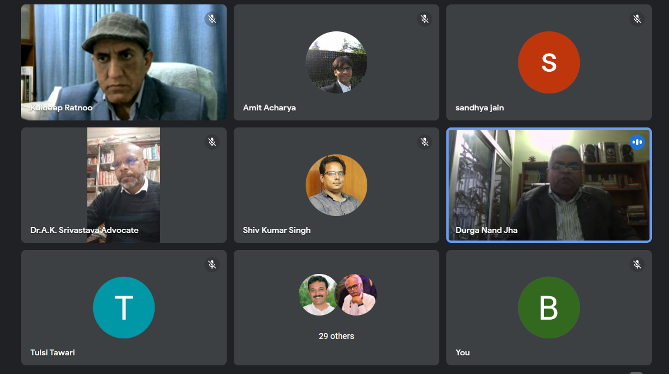
I have written this in my introduction as well as in the chapter on India that our country is moving towards a dangerous situation – the Muslim population is increasing and at the same time there is widespread conversion to Christianity taking place. This may lead to India becoming a battleground for both these religions. Till the time Hindus are in majority, these religions will not fight one another. You may have heard about the Rohingya exodus in Myanmar. When we analyse, it becomes clear that they did not go towards northeast where we have Christian majority states like Nagaland as they wouldn’t have got a hospitable atmosphere there. Instead, they came and settled in areas where there was already a huge Muslim population or in Hindu majority areas. So, if the population of Muslims and Christians keep on increasing in India, it will lead to a situation of conflict.
Second, the approach of Christians and Muslims who have come into our country has not been constructive from the beginning. A lot is said and written about their contribution. How could have people who burnt down libraries and universities contributed to enhancing the culture of this nation? In 48 BC, Alexandria library was burnt down; in India, Nalanda was burnt down. Even if you came here to rule, why did you have to burn down libraries. These acts are basically anti-knowledge. Only those countries have forged ahead that kept aside the precepts of these religions and refused to accept their practices. For example, after Renaissance, Protestants had a huge role to play in the development of Europe.
The Abrahamic religions are basically belief systems, for which you don’t need a lot of logic. And we know, there is not much of a difference between prejudice and belief system. Sanctimonious prejudice is belief. In a belief system, there is no space for questions and you can’t raise doubts. On the contrary, in Sanatan Dharma, you can raise doubts and can question anything. There is space for that. So, if humanity has to forge ahead and there has to be peace in the world, then there have to be certain curbs imposed on the Abrahamic religions. To some extent, these are being imposed in Christian countries because of which we see that the agnostic population is close to 20 per cent in these countries. Many people have stopped going to churches in Europe. These societies have understood the shortcomings of their religion and are ignoring them.
In my study, I have divided the countries into three topological models:
1) Assimilative model – Religious minorities are assimilated into the mainstream through integration policies. In India also, there is a demand for uniform civil code which will integrate all into one model. Assimilative model is further divided into three sub-categories:
a) Repressive assimilation – Religious minorities are assimilated into the mainstream by force. For example, what China is doing to the Muslims in the Xinxiang province.
b) Selective assimilation – Religious minorities are assimilated into the mainstream in certain areas while for the others areas, it is kept separate.
c) Persuasive assimilation – They want assimilation for religious minorities but through softer ways.
2) Discriminative model – In this, religious minorities are discriminated. This is sub-divided into two:
a) Soft discrimination – For example, Indonesia which despite being an Islamic nation still has influences of Hindu culture.
b) Hard discrimination – For example, Pakistan and many of the West Asian countries follow hard discrimination.
3) Promotive model – Religious minorities are given many rights including special rights. They are promoted. The only example for this is India where minorities are given many special facilities by the Government of India for their development.
In my report, I have also raised the issue of religious human rights. I have questioned the Universal Declaration of Human Rights, especially its Article 18. The Christian missionaries had lobbied a lot and succeeded in adding the right to conversion in the declaration. How can the right to convert be part of religious freedom? It is an individual right. It did not include the right to apostasy because Islamic nations were against it. It does not make any sense.
Next, I have focussed on the Organisation of Islamic Cooperation (OIC). The basis of its formation itself is wrong as all the countries came together with religion as the common factor. If all countries join together on the basis of religion, it will lead to a situation of conflict. Crusade is a part of history. Tomorrow, if any religious bloc becomes more powerful than the other, there will be conflict. So, there should not be any communal organisations. Next, OIC does not raise its voice against powerful countries. It does not say a word against China but frequently comes out with resolutions against India. Their double standards further get exposed when their silence about the rights of religious minorities in their own country is taken into consideration. My suggestion is that India should start completely ignoring organisations like OIC, which it has started doing now. We should not give legitimacy to such a communal organisation.
Further in the report, I have argued that religious minorities should also have some obligations. The UN declarations have given rights to religious minorities. It was mentioned in the 1992 Declaration of Minority Rights and several other subsequent declarations but there should also be obligations. If there are special rights, there should be special obligations. During the Second World War, when Hitler attacked Czechoslovakia and Poland, he said that these countries are persecuting Germans and used it as an excuse. Now the UN is using Kashmir as an excuse against India. Because of this, it is important to talk about obligations.
After that, I did special case study of select countries and India was also part of it. The study on India was a bit more detailed as it is the only country with such a huge minority population. Another reason is that the country was ruled by a community for over a thousand years and that community is considered a minority now. India is still trying to reduce the effect of that but has not been fully successful. Many ongoing practices in the judiciary as well as within the police have heavy influences from the period of Muslim rule and also British rule. India’s Sanatan Dharma is alien to the existing system despite being in majority. This mindset of judiciary and bureaucracy has still not changed. In this section, we have stressed on Article 25 of the Indian Constitution which talks about religious freedom. I strongly feel the right to propagate is an extremely wrong insertion. Sanatan Dharma, the main religion of India, does not believe in conversions. So, you are putting the majority in a disadvantageous position. The government needs to look into this and delete the provision of the right to propagate from Article 25. It is objectionable. Secondly, it is not clear whether the right to religion mentioned in this article is an individual right or a group right. All the rights mentioned in this are individual rights but the right to propagate/convert is a group right.
After 2014, two contradictory things have come to light with respect to the Muslim community in India. First is that there is rising intolerance in the country. And second, when demonstrations were being staged against the Citizenship Amendment Act (CAA), it was demanded that Muslims should not be discriminated against. They said that Muslims from Pakistan, Bangladesh and Afghanistan should also get the same rights that were given to persecuted minorities. In my report, I have asked why do you want Muslims from neighbouring countries to come here and suffer the same fate if you feel that India is hostile to Muslims? In a way, the anti-CAA movement was a ratification that Muslims have all the rights and freedom in India, and they want all Muslims to come to India.
I also compared the UN Minority Rights Declaration to the rights given to minorities in the Indian Constitution. It was observed that India is the only country that has given its minorities all the rights mentioned in the UN declaration. In fact, it seems like the Indian Constitution is the precursor to the UN Minority Rights Declaration because the latter came into being only in 1992. In all the 110 countries I studied, it became clear that no country gives as many rights to minorities as India does. I feel fear and greed were two factors that ensured that minorities were given so many rights in India. For example, during the Shah Bano issue, the union government overturned the court’s verdict and once again passed a law that gave the right back to the community to decide their personal laws. This was done primarily due to fear. It was not a result of any long debates or negotiations. After the Sachar Committee report, several rights were given to Muslims due to the greed for votes. It won’t be wrong to argue that India does not have a minority policy. There are many programs and schemes and the objective of these are not clear. Lastly, I made the observation that India’s approach to minorities is affected by a lack of purposefulness.
We also studied other countries like Indonesia, China, Turkey etc. The Alevi population in Turkey does not consider itself a part of Muslim population. They have demanded a minority status but Turkey has not granted it so far. It is interesting to note that Turkey campaigns for the rights of minorities in other nations but refuses to accord minority status to a population that has no similarities with the Muslims of Turkey.
The last section is statistical section. We studied 110 countries and did indexing for all these countries. In it, the first one was State Inclusiveness Index which determined how inclusive are nations when it comes to minority rights. Another index was State Neutrality Index which determined how neutral are countries in the matters of religion. Next is State Discrimination Index which determined how much the State discriminates against its own minorities. Then the State Neutrality Index and the State Inclusiveness Index were combined to form the composite index called the Global Inclusiveness Index and assessed the countries based on this.
We found that no country is as inclusive as India when it comes to granting rights to religious minorities. In the technical note, we have given the details of all the variables used as well as the methodological formula. You can check the veracity of these variables. For example, we have tried to find if there were any head of state who belonged to a religious minority, if there is a public holiday declared on the festivals of the minority community etc. The parameters we chose were macro parameters and we did our indexing based on it. It was found from our study that there was least discrimination in India and also most inclusiveness. While deciding the parameters, we took all precautions to ensure that there was no bias.
In the last section, we have given some recommendations for the UNO. We have suggested that in the Universal Declaration of Human Rights, the UN should keep certain things as universal and some other rights should be considered regional. Every region has its own culture. So, each region should come out with separate declarations and implement them. It will be better for humanity. We have also argued that blasphemy laws should be preventive and not punitive. You cannot sentence someone to death for a wrong word that has come out of his/her mouth. For example, in Iran and Pakistan, punishment for blasphemy is death penalty and it is not right.
I hope I have been able to summarise the report well. I will be happy to answer any questions you may have.
Dr Kuldeep Ratnoo:
Thank you, Durga Nand ji for sharing your insights on important theological issues behind religious discrimination and also throwing light on the methodologies used in preparing the report. Could you please elaborate more on the criteria you used for the rankings?
Shri Durga Nand Jha:
Certain measures are very important in it like when it comes to inclusiveness, I have also looked at whether the minority religions are forced to take part in the festivities of the majority religion. For example, are people from other religions forced to take part in Ramzan? The other factor that the report has looked at is whether minority educational institutions have statutory protection like how it is available in India. We found in our study that it is not available anywhere else in the world other than in India. We also looked at if there has been a decline in the minority population. In India, the population of religious minorities has increased at a higher rate than the majority.
The next factor that we analysed is whether religious minorities are interested in moving to another country? If yes, it would mean that their destination country has treated its minorities well. This is the case with India where minorities from other nations are trying to seek refuge in the country. It needs to be noted that the same is not the case with Iran and Saudi Arabia. Another variable includes the constitutional status of the countries. If it is a theocratic country, there may not be civil rights. For example, the right to form associations, the right to elect governments are not there in many countries. There is no democracy in theocratic nations, because of which there is no liberty too. In fact, there is more liberty in countries that follow democracy and secularism. An important conclusion of our report is that Muslims have only limited rights in Muslim-dominated countries. They have more rights in countries where they are a religious minority, be it European nations, American nations or India.
The next variable we looked at was whether religious conversion is allowed or not. There are close to 41 countries where there is a ban on religious conversions. But the ban is applicable only to the minority community, not allowing it to convert the majority community, but majority can convert the minorities. While in India, the situation is the exact opposite. Though there are no rules, the majority population is being converted to minority religions. This is predominantly due to the benefits given to minorities in India. There are instances where even the Hindus convert because they want the minority status and the benefits that come with it. Even though the minority policy in India was drafted by those in the majority, it is suicidal for the majority community.
Then there is blasphemy law. We make this assumption that if a country has a blasphemy law, then the situation is not good for the minorities of that country because they become vulnerable to the misuse of the law. We have also looked at status of religious freedom and the freedom to worship. There is no such ban in India but it is not possible in all countries. Next, we determined whether state and religion are separate. Here I have argued that India is not a secular country and secularism is a misnomer in this context. India is a religiously positive country and all religions are promoted positively. Secularism means equidistance to all religions. But India does not have that as the majority religion is not promoted as much as the minority religions.
Q & A session
Pradyunman Dutta: In Assam, illegal migration is changing the demography of minorities. Now after NRC, what would be the right way to address this problem – deportation or granting them refugee status. Please enlighten us.
Durga Nand Jha: This is a policy issue and can be answered only by the government.
Pawan Kumar: How much weightage was given for each factor in the final score?
Durga Nand Jha: All the parameters we used were macro parameters and we gave equal weightage for all.
Hemant Tak: Who are the minorities in India? Muslims are in very large numbers. Should they be recognised as minorities? What are the criteria to recognise a group as minority?
Durga Nand Jha: The criteria were decided by the government of India. Since the government recognises them as minority, we will also have to consider them as minority. My personal opinion is that in a secular country, there should not be any majority or minority. Every citizen is equal. There should not be any classification on the basis of religion.
Kuldeep Ratnoo: So, what you mean to say is that this concept of minority and majority will apply only if there is a state religion. Those who do not belong to the state religion can be considered minority.
Durga Nand Jha: Yes, that is right.
Radha Agarwal: How do you explain the difference between a cult and a religion?
Durga Nand Jha: To give an example, you can say that Ahamadiya is a cult. A cult is a small group of people who follow something that does not form part of the mainstream. Jehovah's Witnesses in Christianity is regarded as a cult. They do declare themselves as Christians but they do have some different view.
Sanjeev Nayak: So, does that mean that Ahmadiyas are a cult? Can you also give an example of the equivalent to Jehovah's Witnesses in any other religion.
Durga Nand Jha: The problem is that Muslims are not ready to accept them in any form. Equivalent to Jehovah's Witnesses would be scientologists in Christianity.
Sanjeev Nayak: Can you term Ananda Margis as cult?
Kuldeep Ratnoo: No, in the western thinking anything that is slightly different and organised is considered as a cult. But in Sanatan way of life and thinking, there are large number of differences that can be found within a family also. Different gods are worshipped by members of a family and some even remain atheists. So, there is wider acceptance. Even within different castes in Hinduism, there are many differences. While some cremate their dead, others bury them. If we start calling them as cults due to such slight variations or differences, it will not be the right approach.
Question: Where these parameters mapped through mechanisms like legal constitutional arrangements or was there any field survey done among people?
Durga Nand Jha: No field survey was done. This report was prepared on the basis of constitution, law, public policy and constitutional practices of every nation.
Question: How many countries in your study provide voting rights equally to majority and minority religions?
Durga Nand Jha: Problem is that in many countries we found that there are no voting rights. When there are no voting rights for majority community, how can you say that minority community is not getting it. Most of the countries do have voting rights but expatriates do not have it.
Arjun Ratnoo: In your report, have you included the recommendation that there should be a committee to maintain the religious coordination? Why can’t there be a department within the home ministry or even a separate ministry to deal with the protection of the Sanatanis? We have been attacked for the last 2000 years and these cults have damaged the original religion.
Durga Nand Jha: Yes, even if the government does not have a separate ministry, it should have a separate religious policy. The problem at the moment is that the government does not have any religious policy and secularism has become a shapeless thing. Everybody defines it in their own way. The word secularism was inserted in our Constitution in a devious manner. But I personally believe that the Constitution makers made India implicitly a Hindu state. That is why when K.T. Shah proposed the inclusion of secularism and socialism on 13 December 1948 in the Constituent Assembly, both Nehru and Ambedkar rejected this idea. Later, it was included during the Emergency period when democracy was not at work. It is an invalid insertion. But government must have a religious policy.
Prof Tulsi Tawari: If religion is a personal matter for everybody, why should it be allowed to become an identity issue for any nation?
Durga Nand Jha: It is a pertinent question and you are perfectly right. First, we should define what is secularism. If that is done, it would mean that government do not have to do anything for any religion. Government should not consider religion as an identity in any way. Most of the problem will be solved.
Prof Tulsi Tawari: Is that one of your recommendations too? When we are talking about Sanatan tradition, anybody can be anything. So, this means in India only the value is in majority and not the religion. As an individual, the relationship I have with god is personal. We are not trying to prove to anybody that we are Hindus. By getting into the debates on religion, we are playing the game of the people who want to use religion as a political tool.
Durga Nand Jha: That is right. Even in Sanatan Dharma, we don’t use the word religion. The concept of dharma is very different from that of religion. There are 2-3 important definitions. One is by Manu. You will not find anywhere that every day you have to go to a temple or that you will have to worship any god. It is not required at all. It has been defined that all actions that uplift you or that is in public interest is Dharma. If we keep in mind these definitions of dharma, then there will not be any issue. But the problem is that our government is taking into account Abrahamic views of religion.
Prof Tulsi Tawari: Even within Christianity, if you take away the right to question and debate, people are bound to become rebels. An example of it is the Protestant movement. Let us make a difference between the missionaries and the Christian population. There are only a few Christians who are acting as missionaries and want to use their Christian identity politically. My point is we are playing a game started by somebody else in the name of religion whereas we should take a stand that religion has no place and everybody is free. Then the issue of conversion is also not relevant. What is fundamental is that it should not be a political issue.
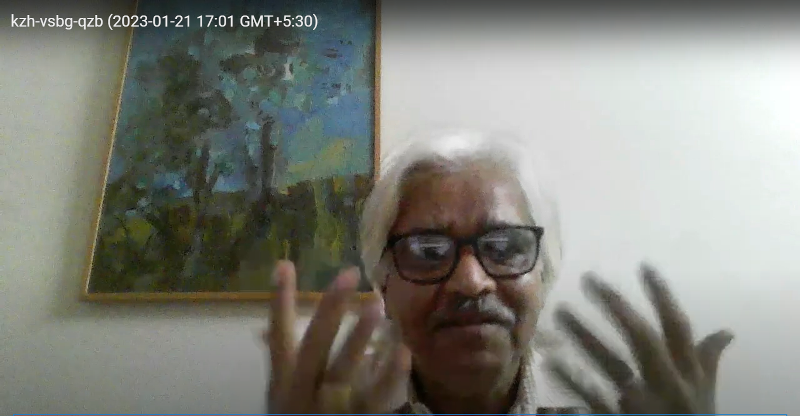
Lekshmi Parameswaran: In your report, you have spoken about the need to rationalise minority policy. What are the immediate policy measures that can be taken for this?
Durga Nand Jha: If you will give a lot of incentives to become minority, then everybody will become minority. That is why I said in the report that the government of India should rationalise its policy. Becoming minority should not become so lucrative that everybody would want to join minority religions. That should be rationalised. Don’t give extra benefit on the basis of religion. Problems like illiteracy and poverty should not be communalised. These are regional problems.
Lekshmi Parameswaran: When it comes to the rights of minorities in India, there are a lot of false narratives that are doing the rounds. An example of this is the politics of food. How can this be countered?
Durga Nand Jha: First of all, government of India should frame a minority policy. The problem is they don’t have a minority policy. They have only programs, schemes etc. and they all are being decided on the basis of electoral consideration. Even this government will be surprised to know that Scheduled Caste and Scheduled Tribe students were getting less amount in scholarship than minority students, particularly Muslims were getting more in scholarship amount. Why should we have such discrimination? There are a lot of things that are needed to be done and this government has not yet touched them.
Sandhya Jain: Conversions are political because the western Christian nations have conversion policy and question India’s and Indians’ resistance to conversion. Why don’t we question them about this?
Durga Nand Jha: We don’t need to question them. We should frame our own policy and ban conversion. In 44 countries, conversion from majority community is banned. If there is conversion in India, a conflictual situation will arise and Muslims and Christians will fight and India will become a battleground for both the Abrahamic religions. The problem is both religions cannot live in peace. So, if India will not impose a blanket ban on conversion, it will endanger its future. That is my position on this issue.
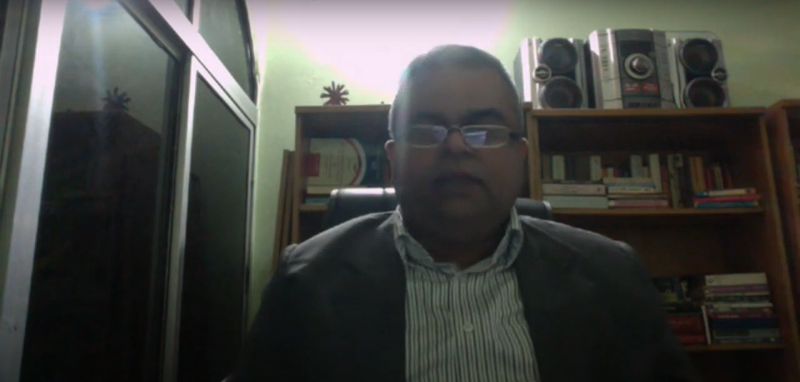
Pradyunman Dutta: I wanted to bring attention to the topic of linguistic minorities particularly in the north-eastern area where many tribes have their own dialect. All of us also know about the insurgency problem here. Can we think on the lines of having a linguistic policy especially for the tribal population?
Durga Nand Jha: You have raised a very important question. I think government of India already has a language policy and is giving some benefits but I have not studied this in detail. One thing I would like to point out is that there are people who are getting double the benefit – that of linguistic minority as well as religious minority. For example, the beneficiaries of Urdu and Farsi are Muslims. But where it is actually needed, the benefits are not reaching. This is the lacunae in the government policy and needs to be corrected.
Prof Sheila Rai: I have no questions but I would like to make the observation that the report was very exhaustive. Many issues were touched upon. The problem is that India’s policy when it comes to minorities has never been clear and there are no two ways about it. In places where Hindus are in majority, we consider Muslims and Christians as minority but in north-eastern states or in certain regions where Hindus are in minority, we do not give them minority status or minority privileges. That is discriminatory and the government should seriously look into it.
Durga Nand Jha: The problem is that all the policies made by the government of India are either based on fear or greed. The ruling establishment is unable to take a clear stand on minorities.
Prof Sheila Rai: You are right. An important parameter that you included in your report was to analyse how many nations have heads belonging to religious minorities. This is very important to understand the existing biases. All the variables you chose are quite illustrative and point very significantly as to how India is different from all the other countries. I only hope that your work spreads further and the world also acknowledges this.
Kuldeep Ratnoo: If we look at the world, there are Catholic church and Protestant church which work like multi-national organisations. Be it in Nagaland or in some tribal areas in Chhattisgarh or Rajasthan, they are all connected at an international level. They are all part of a very rich and politically powerful organisation. You spoke about OIC and the way the Muslim nations and organisations are connected at the global level. Indian Muslims are worried about what happens in Myanmar, Pakistan etc. When the US forces left Afghanistan, India’s Urdu publications celebrated it and claimed it as the victory of Islam. There is a universal brotherhood which has also resulted in a strong support system when it comes to jobs, financial ties etc. A religion that has established itself in a big way at the global level, is in majority in several countries, uses global influence for its advantage in countries like India but still wants benefits of a minority?
Durga Nand Jha: What constitutes a minority is dependent on the policies of a country. At the international level, they are a majority. International minority is people who follow Sanatan Dharma and other religions. The problem is that the international minority do not raise their voices in any country. They never demand for any rights. There is an international network for both Muslims and Christians. The irony is that even by the Indian government, these people are the most pampered. They get benefits from Ministry of Minority Affairs, Department of Education and also from different Boards. The policies of the government of India for minorities are suicidal for the majority. They are counterproductive and do not serve the interests of Sanatan Dharma. A lot needs to be done just to create equivalence. Nobody wants to come from minority to majority community as they don’t want to be in a disadvantageous position.
Prof Pramod Kumar: Sometimes we say that India does not have any religious minority and we are all the same and the difference is only in the way we worship. We say that our DNA is also the same. So, where does the question of majority and minority come in this? We say that Hindutva is not a religion and it is dharma. So why do we talk about religious conversion? I feel that we are confused in all aspects. The second point I want to make is that India has never had a general election that was not religion-based. Can such a nation’s leader make a religious policy?
Durga Nand Jha: There is confusion. One reason for this is that we want to maintain harmony, so we keep finding ways to unite people. When it comes to conversion, my belief is that Hindu is an umbrella term and should not be connected to nationalism. For that, we already have terms like India, Bharat, Hindustani etc. Personally, I feel the term Hindu should be used to describe all religions that have roots in Sanatan Dharma and should not be seen in the context of nationalism. We cannot forcefully impose the term on someone from the Abrahamic religion. Their consent is important. If we ignore certain realities, we will not have the desired positive impact.
Kuldeep Ratnoo: You spoke about how students from minority communities have been getting more scholarship money than students from SC/ST communities. If we see, both the central and state governments have a budget for the minorities. Now there is a debate that the Pasmanda Muslims have been left behind and the Ashraf Muslims have been cornering all the benefits of the schemes. Is it possible that in the name of politics, we robbed the deserving of their rights? Also, I believe that the very concept of minorities came about due to global agenda for conversion, and pressure tactics are used sometimes to defame the country at international level for commercial or strategic interests. Special privileges were taken by Abrahamic religions using these international organisations but the cost of those privileges was borne by the poor and the marginalised. So, shouldn’t there be a discussion on how benefits should be given on the basis of poverty than religion?
Durga Nand Jha: You will be surprised to know the budgetary allocation of government of India for the year 2021-22. The allocation made for the Ministry of Minority Affairs was more than the allocation made to the Ministry of Information and Broadcasting and 1.7 times more than that of Ministry of Culture. It was more than the allocation made to almost 24 Ministries. The amount set aside for scholarships was also more for the Ministry of Minority Affairs compared to the Ministry of Social Justice. When you discriminate at the level of allocation, then there will be discrimination in the amount too.
When it comes to Muslim communalism, it is true that to a large extent, the Ashraf community is responsible for it. They do wield their control over other communities. And I don’t think that the issues of Pasmanda Muslims will make any difference because Islam is a religion-centric community. Ashraf community will not let them get out of the cycle of oppression.
Dr Kuldeep Ratnoo:
Thank you, Durga Nand ji for joining our webinar to discuss the Global Minority Report in an in-depth manner. You and your team worked extensively to bring out this report. Many institutions at the global level including USA, Europe and even India have been unable to publish such well researched report despite having big budgets. It is commendable that you came out with such an exhaustive work individually and with extremely limited resources. I thank you on behalf of India Policy Foundation as well as on behalf of all the participants for the insightful discussion we have had.
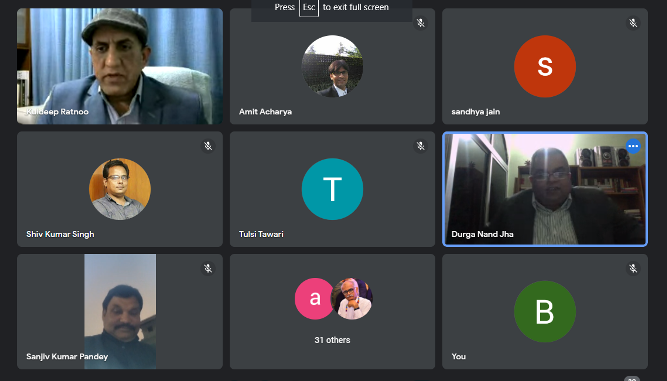
It is true that in any nation only the minorities belonging to Abrahamic religions are given consideration. The problems faced by minorities belonging to any other religion do not get due consideration. The whole concept of majority and minority was popularised at the international level to support the agenda of conversion. The rich and the powerful have been keeping the issue of majority-minority alive for their global alliance and also for their vested interests. The two major global alliances are only concerned about the comforts of their people and do not care if minorities like Buddhists, Sikhs etc. are facing problems elsewhere. Durga Nand ji has taken an initiative and has shown them the mirror. He has shown that India, the nation that they always accuse of hostile to minorities, has extended the minorities most rights and freedom.
We must take this debate of majority-minority forward and should question this very concept. The global alliances are controlling the world. Sitting in Vatican, the church officials decide the appointments in Kerala, or Rajasthan. Then how does it make them a minority? In fact, they are a big international organisation with big funding and has been running an agenda. How can they be termed weak? We should take this issue to the global level. There was talk about linguistic minority. If we start focussing on every issue, then there will never be an end to the minority debate. Looking at the discourses in the West, it is certain that in the coming years, the topic of gender minority will become huge. This is also due to the Leftist ideology in the West that thrives on creating divisions and conflicts in society. We should question the West on larger issues.
Durga Nand ji has done commendable work in coming out with a report that is being discussed at the global level. It is noteworthy than even after two months since the release of the report, no significant criticism of a constructive and logical level has come. Nobody has been able to question the report on the facts and methodology.
I thank him for coming out with this insightful report. I also thank all the participants for joining us today.
Thank you!

